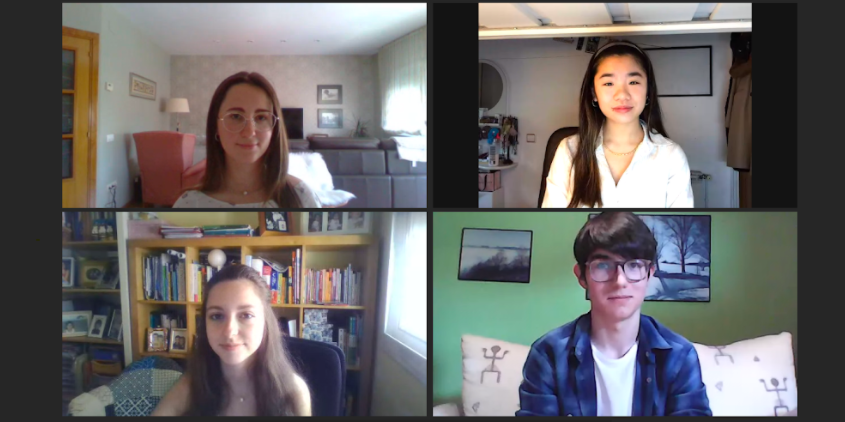XV Ernest Lluch Prize, 2019-2020 edition
XV Ernest Lluch Prize, 2019-2020 edition
An analysis of the fallacies hidden behind election campaigns, Ernest Lluch prize for Social and Political Sciences.
Iris Yun, a student at La Salle Montcada school in Montcada i Reixac is the author of this research study which analyses the misinformation generated amidst an excess of information. The jury also granted three runners-up prizes for research into victims of Francoism, a journey through a family’s history, and a historical review of the concept of democracy.

The prize-winners during the virtual prize-giving ceremony. From left to right: Elvira Norte, Iris Yun, María Martí and Pau Ortega.
“Arguments per defensar les idees. Anàlisi de les fal·làcies en les campanyes electorals”, (Arguments to defend ideas. Analysis of the fallacies in election campaigns), by Iris Yun, a student at La Salle Moncada school in Moncada i Reixac, has won the Ernest Lluch prize for Social and Political Sciences organized jointly by the Ernest Lluch Foundation and the UPF Faculty of Political and Social Sciences. For this fifteenth edition of the prize, 65 research projects were submitted by students from all over Catalonia and, apart from the main prize, three special mentions were also awarded.
The winning research analyses the misinformation generated amidst an excess of information in the political system, which leads to its collapse and hinders decision-making. To do so, it meticulously examines the types of fallacies based on specific cases, like the speeches by Donald Trump, electoral propaganda and the social networks of the major political parties in Catalonia and Spain.
The jury was chaired by Miguel Salvador, dean of the UPF Faculty of Political and Social Sciences; Jordi Guiu, David Sancho and Pedro Jódar, lecturers at the UPF Department of Political and Social Sciences and members of the Ernest Lluch Foundation.
It deemed that the winner is “a comprehensive, original piece of comparative work that is interesting in all respects” and also highlights “the approach to the analysis of political communication, campaign strategies and techniques as well as their current derivations; post-truth, fake news and amplification in the networks”.
The award ceremony for the Ernest Lluch prize was held today, 29 May, via video conference, due to the Covid-19 health alert. The prize is endowed with €700.
Three honourable mentions for a study on the victims of Francoism, another on the journey of a family, and a historical review of the concept of democracy
Besides the main prize, the jury also awarded three honourable mentions. One for the work entitled “Quadre 1er esquerra, fila 7, sepultura 19. En record d’una víctima de la repressió franquista” (Square 1 left, row 7, grave 19. In memory of a victim of the Franco regime.), by María Martín, a student at the Institut Terra Alta in Gandesa. The author explores the biography of a court secretary of a municipality of the Maestrazgo in Castellón who was shot dead in 1942. The jury valued the fact that the research pursues a story of life that is “very well told, with dedication and meticulousness, well documented and exquisitely presented, with noteworthy, comprehensive consultation of the archives”.
“Un viatge de quatre segles a través de la família” (A four-century journey through the family), by Elvira Norte of Escola Puigcerver school in Reus, studies a “somewhat sociological, somewhat historical, somewhat legal, somewhat anthropological, somewhat demographic, and especially genealogical” family journey. The jury highlighted the “incredible capacity for work” resorting to documentary sources, interviews and the analysis and use of specific software. Also, its sensitivity towards women and their problems over the years, especially during the Franco regime and the documentary and photographic annexes accompanying the research.
Finally, “Què és la democràcia? Una visió històrica de la democràcia occidental per entendre millor el món on vivim”” (What is democracy? A historical view of Western democracy to better understand the world we live in), by Pau Ortega, of Institut Antoni Pousi Argila in Barcelona, examines the concept of democracy throughout history, from the Greek era, with the aim of determining the future of democracy today. The jury praised the analysis as well as “the interviews with experts and the results of a survey steered by an interesting questionnaire”, as well as its ambitiousness and the author’s capacity for research and theoretical synthesis. Each runner-up received a prize of €100.
